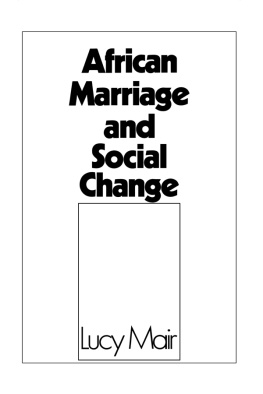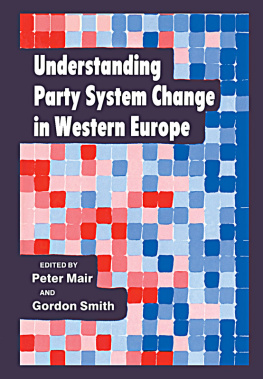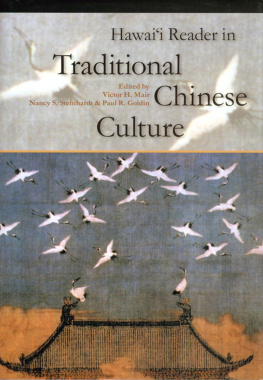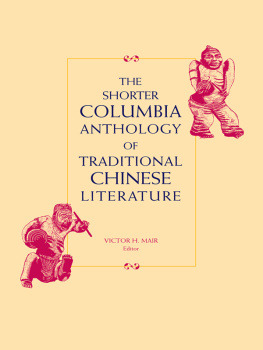ANTHROPOLOGY AND SOCIAL CHANGE
LONDON SCHOOL OF ECONOMICS MONOGRAPHS ON SOCIAL ANTHROPOLOGY
Managing Editor: Anthony Forge
The Monographs on Social Anthropology were established in 1940 and aim to publish results of modern anthropological research of primary interest to specialists.
The continuation of the series was made possible by a grant in aid from the Wenner-Gren Foundation for Anthropological Research, and more recently by a further grant from the Governors of the London School of Economics and Political Science.
The Monographs are under the direction of an Editorial Board associated with the department of Anthropology of the London School of Economics and Political Science.
First published 1969 by The Athlone Press
Published 2020 by Routledge
2 Park Square, Milton Park, Abingdon, Oxon OX14 4RN
605 Third Avenue, New York, NY 10017
Routledge is an imprint of the Taylor & Francis Group, an informa business
Lucy Mair, 1969
All rights reserved. No part of this book may be reprinted or reproduced or utilised in any form or by any electronic, mechanical, or other means, now known or hereafter invented, including photocopying and recording, or in any information storage or retrieval system, without permission in writing from the publishers.
Notice:
Product or corporate names may be trademarks or registered trademarks, and are used only for identification and explanation without intent to infringe.
ISBN 13: 978-0-4851-9638-2 (pbk)
ACKNOWLEDGEMENTS
I have to acknowledge permission to republish material from the editors of Africa, World Affairs, Indonesie, the British Journal of Sociology, The Advancement of Science, XIX, 1962 and XXI, 19645, Comparative Studies in Society and History, the Transactions of the New York Academy of Sciences, and Cahiers DEtudes Africaines, II, No. 6, 1962 and IV, No. 15, 1964, and to the Institute of Race Relations; also to the Institut Solvay, Brussels, for permission to reproduce a paper given at a conference on Native Economy in Africa.
This book includes some essays that were earlier published with the title Studies in Applied Anthropology. The substitution of the phrase social change for the label by which my teaching post at the London School of Economics was described is no accident, but rather an admission. Anyone who claims to apply a theoretical discipline is offering to do something with it. All I have ever been able to do is trace out the changes that European technical knowledge, particularly under colonial rule, has brought to the societies which at different times have been called primitive, backward, underdeveloped, developing, and are at the moment officially, it seems, known as less developed.
DO WE APPLY ANTHROPOLOGY?
Anthropologists have always had to claim that this kind of study is useful, because it is expensive, and they are in competition with other specialists who put forward similar claims, perhaps more convincingly. Useful to whom, for what? Are we offering to tell people what to do, or how to do it?
Or can it be that what we actually offer is really neither? We have in practice sometimes been allowed to impart something of what we know to people whose aim it is to promote social change in less developed countries. Englishmen training as colonial administrators used to learn a little anthropology, Frenchmen and Belgians rather more. In Britain today teachers, health education-ists, community development and other social welfare workers, sometimes even architects, are exposed to social anthropology for shorter or longer periods. Once this would have meant ethnography: descriptions of the traditional customs of the peoples among whom the men and women taking the course might be expected to find themselves. There are no longer any colonial administrators. The various specialists I have mentioned learn, if they listen and are given enough time, what are the implications of the changes they are seeking to produce, and what has been the general effect on societies of simple technology of the stream of changes to which each of them is making his contribution. But this is not applying anthropology; it is applying one or other specialist technique with a little background knowledge of the human reactions to be expected.
Rather more was claimed in the heyday of applied anthropology, when Malinowski was writing his articles in Africa, the organ of a new institution (then) which could be said in a sense to have been founded to promote the subject. The founders of the International African. Institute did not think of it as a learned society, but as an organization which should seek knowledge as the basis of enlightened policies. In 1932 they published a research programme the object of which was defined as bringing about a better understanding of the factors of social cohesion in original African society, the ways in which these are being affected by the new influences, tendencies towards new groupings and the formation of new social bonds, and forms of co-operation between African societies and western civilization. This knowledge, it was argued, would enable those in authority to foster the growth of a healthy, progressive, organized society, and would assist all those with practical aims in Africa in determining the right relations between the institutions of African Society and alien systems of government, education and religion, in preserving what is vital in the former and in eliminating unnecessary conflict between the latter and African tradition, custom and mentality. The emphasis was on the integration of innovation into an existing framework, with the implication that tradition should be preserved wherever possible and the rate of change be not deliberately accelerated. This was a tenable attitude in a period of economic stagnation and an age when the indefinite continuance of colonial rule was taken for granted. There was room for argument about what innovations were necessary, and here professional anthropologists, with their greater tolerance of customs repugnant to humanity and natural justice, were more conservative than the men with practical aims whom their research was expected to assist. In these circumstances there could be no application of anthropology in any meaningful sense; anthropologists were asserting principles that the practical man was committed to reject.
But the African Institute Fellows were pioneers in the kind of anthropology that is directed towards the study of change rather than the reconstruction of a hypothetical untouched society; and if applied anthropology is indeed the study of social change, they can be said to have introduced it.
What else is it or can it be? Ought we to speak of applied anthropology when what we mean is indicating the social context in which knowledge from some other field is to be applied? Very occasionally an anthropologist has the opportunity of saying what will happen if . An example is Elizabeth Colsons (1950) excellent discussion of the likely consequences of recognizing the right to make wills in a matrilineal society where men who had property - and their sons - were beginning to resent the right of sisters sons to inherit. But there are not many such; and the government of Zambia still does not recognize wills.
So while I think the study of social change is inseparable from any anthropological work at the presenttime, I regret that Applied Anthropology should have come to be thought of as an independent subject. There is little harm in making it an examination option - except when examiners demand that the questions set should







